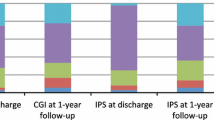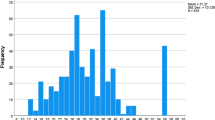Abstract
The purpose of this study was to assess the nature and severity of psychological symptoms of distress as reported by patients in a rehabilitation setting. We used the Symptom Checklist 90—Revised (SCL-90-R) to differentiate between levels of distress among our sample of 104 rehabilitation patients and the norms for adult psychiatric and normal populations. The study also attempted to determine if the levels of distress differed among four diagnostic groups (amputees,n=21; brain injury,n=23; cerebrovascular accident group,n=24; and mixed diagnostic group,n=36). Results indicated that our sample differed significantly in the anticipated direction from nonpatient and outpatient psychiatric norms. Our findings did not support the use of the SCL-90-R as a single-criterion screening device. However, our findings confirmed that the SCL-90-R has considerable utility in rehabilitation settings as a research instrument for measuring group differences.
Similar content being viewed by others
References
Arrindell, W. A., and Ettema, H. (1981). Dimensional structure, reliability, and validity of the Dutch Version of the symptom checklist (SCL-90): Data based on a phobic and “normal” population.Ned Tijdschr Psychol. Haar Grensgebieden 26: 77–108.
Bastecky, J., Boleloucky, Z., and Skovronsky, O. (1981). Psychotropic drugs in acoustic and vestibular disorders.Activ. Nerv. Super. 23: 187–188.
Blank, K., and Perry, S. (1984). Relationship of psychological processes during delirium to outcome.Am. J. Psychiat. 141: 843–847.
Briere, J., and Runtz, M. (1990). Augmenting Hopkins SCL scales to measure dissociative symptoms: Data from two nonclinical samples.J. Person. Assess. 55: 376–379.
Brophy, C. J., Norvell, N. K., and Kiluk, D. J. (1988). An examination of the factor structure and convergent and discriminant validity of the SCL-90-R in an outpatient clinic population.J. Person. Assess. 52: 334–340.
Buckelew, S. P., Burk, J. P., Brownley-Duffeck, M., Frank, R. G., and DeGood, D. (1988). Cognitive and somatic aspects of depression among a rehabilitation sample: Reliability and validity of SCL-90-R research subscales.Rehab. Psychol. 33: 67–75.
Clark, A., and Friedman, M. J. (1983a). Factor structure and discriminant validity of the SCL-90 in a veteran psychiatric population.J. Person. Assess. 47: 396–404.
Clark, A., and Friedman, M. J. (1983b). Nine standardized scales for evaluating treatment outcomes in a mental health clinic.J. Clin. Psychol. 39: 939–950.
Cyr, J. J., and Atkinson, L. (1986). Selection of the appropriate number of factors: A case of questionable dimensions.Psychol. Rep. 58: 251–256.
Cyr, J. J., McKenna-Foley, J., and Peacock, E. (1985). Factor structure of the SCL-90-R: Is there one?J. Person. Assess. 49: 571–577.
Derogatis, L. R. (1977)SCL-90-R: Administration Scoring and Procedure Manual. Baltimore: Clinical Psychometrics Research.
Derogatis, L. R. (1983). Misuse of the Symptom Checklist 90.Arch. Gen. Psychiat. 40: 1152.
Derogatis, L. R., Rickels, K., and Rock, A. (1976). The SCL-90 and the MMPI: A step in the validation of a new self-report scale.Br. J. Psychiat. 128: 280–289.
Derogatis, L. R., Meyer, J. K., and King, K. M. (1981). Psychopathology in individuals with sexual dysfunction.Am. J. Psychiat. 138: 757–763.
Dinning, W. D., and Evans, R. G. (1977). Discriminant and convergent validity of the SCL-90 in psychiatric inpatients.J. Person. Assess. 41: 304–310.
Edwards, D. W. (1978). Test taking and the stability of the adjustment scales: Can we assess patient deterioration?Eval. Q. 2: 275–291.
Eisenberg, M. G., and Jansen, M. A. (1983). Rehabilitation psychology: State of the art.Annu. Rev. Psychol. 3: 1–31.
Eisenberg, M. G., and Jansen, M. A. (1987). Rehabilitation psychologists in medical settings: A unique subspecialty or a redundant one?Prof. Psychol. Res. Pract. 18: 475–478.
Frierson, R. L., and Lippmann, S. B. (1987). Psychiatric consultation for acute amputees. Report of a ten-year experience.Psychosomatics 28: 183–189.
Gotlib, I. (1984). Depression and general psychopathology in university students.J. Abnorm. Psychol. 93: 19–30.
Johnson, R. W., Ellison, R. A., and Heikkenen, C. A. (1989). Psychological symptoms of counseling centre clients.J. Counsel. Psychol. 36: 110–114.
Kales, A., Soldatos, C. R., Caldwell, A. B., Charney, D. S., Kales, J. D., Markel, D., and Cadieux, R. (1980). Nightmares. Clinical characteristics and personality patterns.Am. J. Psychiat. 137: 1197–1201.
Kass, F., Skodol, A., Buckley, P., and Charles, E. (1980). Therapists' recognition of psychopathology: A model for quality review of psychotherapy.Am. J. Psychiat. 137: 87–90.
Lucente, F. E., and Fleck, S. (1972). A study of hospitalization anxiety in 408 medical and surgical patients.Psychosom. Med. 34: 304–312.
MacBridge, A., Rogers, J., Whylie, B., and Freeman, S. J. (1980). Psychological factors in the rehabilitation of elderly amputees.Psychosomatics 21: 258–265.
Magni, G., Schiforo, F., and de Leo, D. (1986). Assessment of depression in an elderly medical population.J. Affect. Disord. 11: 121–124.
Mauss-Clum, N., and Ryan, M. (1981). Brain injury and the family.J. Neurosurg. Nurs. 13: 165–169.
Millon, T. (1983)Million Clinical Multiaxial Inventory, 3rd ed., Interpretive Scoring Systems, Minneapolis.
Nahmias, L. M., Beutler, L. E., Crago, M., Osborn, K., and Hughes, J. H. (1983). Use of the SCL-90-R to assess health care staff's perceptions of patients psychological states.Percept. Motor Skills 57: 293–301.
Peveler, R. C., and Fairburn, C. G. (1990). Measurement of neurotic symptoms by self report questionnaire: Validity of the SCL-90-R.Psychol. Med. 20: 873–879.
Saravay, S. M., Steinberg, M. D., Weinschel, B., Pollack, S., and Alovis, N. (1991). Psychological comorbidity and length of stay in the general hospital.Am. J. Psychiat. 148: 324–329.
Sbordone, R. J., Kral, M., Gerard, M., and Katz, M. (1984). Evidence of a “command performance syndrome” in the significant others of the victims of severe traumatic head injury.Int. J. Clin. Neuropsychol. 6: 183–185.
Schubert, D. S. P., Burns, R., Paras, W., and Sioson, E. (1992). Increase of medical hospital length of stay by depression in stroke and amputation patients: A pilot study.Psychother. Psychosom. 57: 61–66.
Steer, R. A., Platt, J. J., Raniere, W. F., and Metzger, D. S. (1989). Relationship of SCL-90 profiles to methadone patients' psychosocial characteristics and treatment response.Multivar. Exp. Clin. Res. 9: 45–54.
Turk, D. C. (1990). Customizing treatment for chronic pain patients: Who, what, and why.Clin. J. Pain 6: 255–270.
Turner, R. M., McGovern, M., and Sandrock, D. (1983). A multiple perspective analysis of schizophrenics' symptoms and community functioning.Am. J. Commun. Psychol. 11: 593–607.
Author information
Authors and Affiliations
Rights and permissions
About this article
Cite this article
Brackstone, M.J., Delehanty, R., Mann, B. et al. The nature and severity of distress among rehabilitation hospital patients. Int J Rehab Health 1, 37–48 (1995). https://doi.org/10.1007/BF02214960
Issue Date:
DOI: https://doi.org/10.1007/BF02214960




